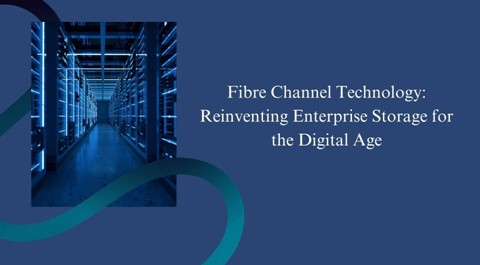Enterprise storage is undergoing a transformation, driven by the relentless growth of digital data and the demand for high-performance computing. At the forefront of this evolution is Fibre Channel technology, an innovation that is redefining how organizations manage, transfer, and secure their data. Mohan Babu Talluri Durvasulu, an expert in enterprise computing, explores how this technology is shaping the future of storage networking.
The Data Tsunami and the Need for High-Speed Networking
With digital data volumes expected to reach 181 zettabytes by 2025, enterprises face mounting challenges in ensuring seamless, high-performance connectivity. Traditional networking solutions, such as Ethernet, often fall short in meeting the demands of high-speed, low-latency data transfers required for mission-critical applications. Fibre Channel technology provides a robust alternative by establishing a dedicated, high-bandwidth communication path between servers and storage systems. Designed specifically for storage networking, Fibre Channel minimizes data loss, enhances security, and supports rapid scalability. Its ability to handle intensive computational workloads makes it essential for industries relying on real-time analytics, large-scale virtualization, and enterprise cloud environments.
A Fabric-Based Architecture for Unparalleled Performance
Fibre Channel technology stands out due to its fabric-based architecture, which departs from traditional point-to-point or hierarchical network designs. Instead of relying on a central switch or a single connection path, Fibre Channel establishes a dynamic, fully interconnected fabric that supports seamless scalability. This design enables it to accommodate up to 16 million unique device addresses, ensuring unparalleled flexibility for growing enterprise storage needs. By eliminating bottlenecks and optimizing data transfer efficiency, Fibre Channel enhances performance, reliability, and redundancy. Its self-healing nature and intelligent routing capabilities make it ideal for high-demand computing environments, such as data centers and cloud infrastructures.
Speed and Scalability: Pushing the Limits of Data Transfer
Fibre Channel technology has seen significant advancements in data transfer speeds, reaching up to 128 Gbps in modern implementations. This capability is crucial for industries such as financial services, scientific research, and cloud computing, where real-time access to data is a necessity. Additionally, Fibre Channel networks are designed to scale seamlessly, supporting businesses as they expand their storage infrastructure to meet growing digital demands.
Reliability and Fault Tolerance: Ensuring Data Integrity
In enterprise environments where data loss is not an option, Fibre Channel technology stands out for its robust fault tolerance mechanisms. Advanced error detection, redundant network paths, and self-healing capabilities ensure that organizations can maintain operational continuity even in the face of hardware failures. This reliability makes Fibre Channel the preferred choice for mission-critical applications, including high-frequency trading platforms and healthcare data systems.
Fibre Channel and Virtualization: Enhancing Cloud Deployments
As virtualization becomes the norm in modern IT environments, Fibre Channel technology plays a crucial role in optimizing storage performance for virtualized workloads. The ability to allocate storage dynamically and ensure fast data access allows businesses to maximize the efficiency of their virtual machines. This has led to Fibre Channel being a key component in data centers, powering cloud services with greater agility and responsiveness.
Security Innovations: Protecting Enterprise Data
Security is a growing concern in today’s digital landscape, and Fibre Channel addresses these challenges through advanced encryption and access control mechanisms. The implementation of zoned security and authentication protocols minimizes the risk of unauthorized data access, ensuring that sensitive enterprise information remains protected. With cyber threats evolving rapidly, Fibre Channel’s built-in security features provide a critical layer of defense against potential breaches.
Future Prospects: Software-Defined Storage and Beyond
The future of Fibre Channel technology lies in its integration with software-defined storage solutions. By decoupling storage management from physical hardware, organizations can achieve greater flexibility, efficiency, and automation in their storage infrastructure. The convergence of Fibre Channel with emerging technologies such as AI-driven analytics and quantum computing will further push the boundaries of enterprise data management.
In conclusion, as enterprises continue to navigate the complexities of data-intensive workloads, Fibre Channel technology remains at the forefront of innovation. Its unmatched speed, scalability, and reliability make it an essential component of modern storage networking strategies. Mohan Babu Talluri Durvasulu underscores the transformative impact of this technology, positioning Fibre Channel as the backbone of future-ready enterprise storage solutions.





























